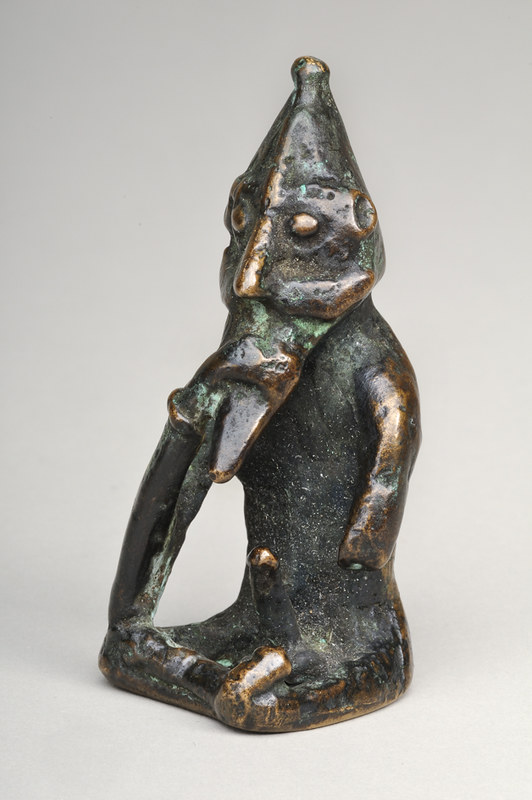Archive for the ‘Feelings’ Category
What do you want?
 If you always want to be right, it’s time to ask new questions.
If you always want to be right, it’s time to ask new questions.
If you want to listen well, don’t talk.
If you want to start something new, stop something old.
If you want to do it again for the third time. give someone else a chance.
If you want it to be perfect, you don’t want to finish.
If you want to do something new, be unsure about what to do next.
If you want to hold tightly to things as they are, all you get are rope burns.
If you want to teach, find a student.
If you want someone’s trust, earn it.
If you want all the credit, you’re fast becoming a team of one.
If you want the Universe to change, don’t.
If you want to earn trust, tell the truth.
If you want good friends, be one.
Image credit — Sowhuan
Are you making progress?
 Just before it’s possible, it’s impossible.
Just before it’s possible, it’s impossible.
An instant before you know how to do it, you don’t.
After searching for the answer for a year, you may find it in the next instant.
If you stop searching, that’s the only way to guarantee you won’t find it.
When people say it won’t work, their opinion is valid only if nothing has changed since the last time, including the people and their approach.
If you know it won’t work, change the approach, the specification, or the scope.
If you think it won’t work, that’s another way of saying “it might work “.
If you think it might work, that’s another way of saying “it might not work”.
When there’s a difference of opinion, that’s objective evidence the work is new.
If everyone sees it the same way, you’re not trying hard enough.
When you can’t predict the project’s completion date, that’s objective evidence that the work is new.
If you know when the project will be done, the novelty has been wrestled out of the project or there was none at the start.
When you don’t start with the most challenging element of the project, you cause your company to spend a lot of money on a potentially nonviable project.
Until the novel elements of a project are demonstrated, there is no real progress.
“Jumping Backwards – Cape Verde, Sal Rei” by Espen Faugstad is licensed under CC BY 2.0.
Four Things That Matter
 Health matters. What did you do this year to take care of your physical health? What did you do this year to take care of your mental health? Next year what can you stop doing to make it easier to take care of your physical and mental health? Without your health, what do you have?
Health matters. What did you do this year to take care of your physical health? What did you do this year to take care of your mental health? Next year what can you stop doing to make it easier to take care of your physical and mental health? Without your health, what do you have?
Family matters. What did you do this year to connect more deeply with your family? And how do you feel about that? Next year what can you change to make it easier to deepen your relationships with a couple of family members? If you’re going to forgive anyone next year, why not forgive a family member? Without family, what do you have?
Friends matter. What did you do this year to reconnect with old friends? What did you do this year to help turn a good friendship into a great one? What did you do this year to make new friends? Next year what will make it easier to reestablish old friendships, deepen the good ones, and create new ones? Without friends, what do you have?
Fun matters. What did you do this year to have fun for fun’s sake? Why is it so difficult to have fun? Next year what can you change to make it easier for you to have more fun? Without fun, what do you have?
“Friendship” by *~Dawn~* is licensed under CC BY 2.0.
What would you do differently if you believed in yourself more?
Belief in yourself manifests in your actions. What do your actions say about your belief in yourself?
Belief in yourself doesn’t mean everything will work out perfectly. It means that you’ll be okay regardless of how things turn out.
When you see someone that doesn’t believe in themselves, how do you feel? And what do you do?
And when that someone is you, how do you feel? And what do you do?
When someone believes in you more than you do, do you believe them?
You reach a critical threshold when your belief in yourself can withstand others’ judgment of you.
When you believe in yourself, you don’t define yourself by what others think of you.
When you love yourself more, you believe in yourself more.
If you had a stronger belief in yourself, what would you do differently?
Try this. Make a list of three things you’d do differently if you had a stronger belief in yourself. Then, find one of those special people that believe in you and show them your list. And whatever they say about your list, believe them.
Image credit — ajari
The Ins and Outs of Things
 When things are overwhelming to you but not to others, it’s okay to feel overwhelmed for a while.
When things are overwhelming to you but not to others, it’s okay to feel overwhelmed for a while.
When the seas are rough, you may think you are alone, but others may see it differently.
What’s worthy of your attention is defined by you, though some make it easy for you to think otherwise.
When you disagree with someone’s idea, that says nothing about them.
Judging someone from the outside is unfair, and it’s the same with judging yourself from the inside.
When everyone around you sees you differently than you see yourself, it’s worth looking critically at what you see that they don’t and what they see that you don’t.
You aren’t your thoughts and feelings, but it can feel like it in the heat of the moment.
Self-judgment is the strongest flavor of judgment.
“Object from the exhibition We call them Vikings produced by The Swedish History Museum” by The Swedish History Museum, Stockholm is licensed under CC BY 2.0.
Work Like You Matter
 When you were wrong, the outcome was different than you thought.
When you were wrong, the outcome was different than you thought.
When the outcome was different than you thought, there was uncertainty as the work was new.
When there was uncertainty, you knew there would be learning.
When you were afraid of learning, you were afraid to be wrong.
And when you were afraid to be wrong, you were really afraid about what people would think of you.
Would you rather wall off uncertainty to prevent yourself from being wrong or would you rather try something new?
If there’s a difference between what others think of you and what you think of yourself, whose opinion matters more?
Why does it matter what people think of you?
Why do you let their mattering block you from trying new things?
In the end, hold onto the fact that you matter, especially when you have the courage to be wrong.
“Oh no, what went wrong?” by Bennilover is marked with CC BY-ND 2.0.
Effective Interactions During Difficult Times
 When times are stressful, it’s more difficult to be effective and skillful in our interactions with others. Here are some thoughts that could help.
When times are stressful, it’s more difficult to be effective and skillful in our interactions with others. Here are some thoughts that could help.
Decide how you want to respond, and then respond accordingly.
Before you respond, take a breath. Your response will be better.
If you find yourself responding before giving yourself permission, stop your response and come clean.
Better responses from you make for even better responses from others.
If you interrupt someone in the middle of their sentence so you can make your point, you made a different point.
If you find yourself preparing your response while listening to someone, that’s not listening.
If you recognize you’re not listening, now there are at least two people who know the truth.
When there are no words coming from your mouth, that doesn’t constitute listening.
The strongest deterrent to listening is talking.
If you disagree with one element of a person’s position, you can, at the same time, agree with other elements of their position. That’s how agreement works.
If you start with agreement, even the smallest bit, disagreement softens.
Before you can disagree, it’s important to listen and understand. And it’s the same with agreement.
It’s easy to agree if that’s what you want to accomplish. And it’s the same for disagreement.
If you want to move toward agreement, start with understanding.
If you want to demonstrate understanding, start with listening.
If you want to demonstrate good listening, start with kindness.
Here are three mantras I find helpful:
Talk less to listen more.
Before you respond, take a breath.
Kindness before agreement.
“Rock-em” by REL Waldman is licensed under CC BY-SA 2.0
A Leading Indicator of Personal Growth — Fear
 When was the last time you did something that scared you? And a more important follow-on question: How did you push through your fear and turn it into action?
When was the last time you did something that scared you? And a more important follow-on question: How did you push through your fear and turn it into action?
Fear is real. Our bodies make it, but it’s real. And the feelings we create around fear are real, and so are the inhibitions we wrap around those feelings. But because we have the authority to make the fear, create the feelings, and wrap the inhibitions, we also have the authority to unmake, un-create, and unwrap.
Fear can feel strong. Whether it’s tightness in the gut, coldness in the chest, or lushness in the face, the physical manifestations in the body are recognizable and powerful. The sensations around fear are strong enough to stop us in our tracks. And in the wild of a bygone time, that was fear’s job – to stop us from making a mistake that would kill us. And though we no longer venture into the wild, fear responds to family dynamics, social situations, interactions at work, as if we still live in the wild.
To dampen the impact of our bodies’ fear response, the first step is to learn to recognize the physical sensations of fear for what they are – sensations we make when new situations arise. To do that, feel the sensations, acknowledge your body made them, and look for the novelty, or divergence from our expectations, that the sensations stand for. In that way, you can move from paralysis to analysis. You can move from fear as a blocker to fear as a leading indicator of personal growth.
Fear is powerful, and it knows how to create bodily sensations that scare us. But, that’s the chink in the armor that fear doesn’t want us to know. Fear is afraid to be called by name, so it generates these scary sensations so it can go on controlling our lives as it sees fit. So, next time you feel the sensations of fear in your body, welcome fear warmly and call it by name. Say something like, “Hello Fear. Thank you for visiting with me. I’d like to get to know you better. Can you stay for a coffee?”
You might find that Fear will engage in a discussion with you and apologize for causing you trouble. Fear may confess that it doesn’t like how it treats you and acknowledge that it doesn’t know how to change its ways. Or, it may become afraid and squirt more fear sensations into your body. If that happens, tell Fear that you understand it’s just doing what it evolved to do, and repeat your offer to sit with it and learn more about its ways.
The objective of calling Fear by name is to give you a process to feel and validate the sensations and then calm yourself by looking deeply at the novelty of the situation. By looking squarely into Fear’s eyes, it will slowly evaporate to reveal the nugget of novelty it was cloaking. And with the novelty in your sights, you can look deeply at this new situation (or context or interpersonal dynamic) and understand it for what it is. Without Fear’s distracting sensations, you will be pleasantly surprised with your ability to see the situation for what it is and take skillful action.
So, when Fear comes, feel the sensations. Don’t push them away. Instead, call Fear by name. Invite Fear to tell its story, and get to know it. You may find that accepting Fear for what it is can help you grow your relationship with Fear into a partnership where you help each other grow.
“tractor pull 02 – Arnegard ND – 2013-07-04” by Tim Evanson is licensed under CC BY-SA 2.0
What It Takes
 Speak up. Your ideas can’t see daylight unless others know about them.
Speak up. Your ideas can’t see daylight unless others know about them.
Be wrong. When you’re wrong, you sharpen the rightness.
Be right. When you’re right in the face of wrongness, everyone wins, except for you.
Stand tall. Stand behind your decisions, but you can’t be responsible for their outcome.
Be truthful, but not hurtful.
Be overwhelmed. This is difficult.
Give it away. When things go well, delegate credit to the up-and-coming. They’ll remember.
Support others. When someone’s in the bucket, pull them out. They’ll remember.
Pay it forward. A kind soul gave it to you, and it’s time to give it to someone else. They’ll remember.
Say “thank you.” And mean it.
Be quiet. When things are on the right track, there’s no need to derail.
Take the heat. When there’s a mistake, own it so the young don’t have to. They’ll remember.
Make room for others. Nothing blocks their growth like your career aspirations.
Say nothing negative, unless you can’t. And if you must, say it in private.
Praise publicly, loudly, and often.
Set up others for success. And when accused of doing so, plead ignorance.
Share your frustrations, but sparingly. Done skillfully, it’s a compliment.
Be human. People will notice.
“Uncomfortable Fisher” by DaveFayram is licensed under CC BY-SA 2.0
What Good Coaches Do
 Good coaches listen to you. They don’t judge, they just listen.
Good coaches listen to you. They don’t judge, they just listen.
Good coaches continually study the game. They do it in private, but they study.
Good coaches tell you that you can do better, and that, too, they do in private.
Good coaches pick you up off the floor. They know that getting knocked over is part of the game.
Good coaches never scream at you, but they will cry with you.
Good coaches never stop being your coach. Never.
Good coaches learn from you, and the best ones tell you when that happens.
Good coaches don’t compromise. Ever.
Good coaches have played the game and have made mistakes. That’s why they’re good coaches.
Good coaches do what’s in your best interest, not theirs.
Good coaches are sometimes wrong, and the best ones tell you when that happens.
Good coaches don’t care what other people think of them, but they care deeply about you.
Good coaches are prepared to be misunderstood, though it’s not their preference.
Good coaches let you bump your head or smash your knee, but, otherwise, they keep you safe.
Good coaches earn your trust.
Good coaches always believe you and perfectly comfortable disagreeing with you at the same time.
Good coaches know it’s always your choice, and they know that’s how deep learning happens.
Good coaches stick with you, unless you don’t do your part.
Good coaches don’t want credit. They want you to grow.
Good coaches don’t have a script. They create a custom training plan based on your needs.
Good coaches simplify things when it’s time, unless it’s time to make things complicated.
Good coaches aren’t always positive, but they are always truthful.
Good coaches are generous with their time.
Good coaches make a difference.
Regardless of the problem, the solution lives inside you.
 If you want things to be different than they are, you have a problem. And if you want things to stay the same, you also have a problem. Either way, you have a problem. You can complain, you can do something about it, or you can accept things as they are.
If you want things to be different than they are, you have a problem. And if you want things to stay the same, you also have a problem. Either way, you have a problem. You can complain, you can do something about it, or you can accept things as they are.
Complaining can be fun for a while, then it turns sour. Doing something about it can take a lot of time and energy, and it’s difficult to know what to do. Accepting things as they are can be a challenge because that means it’s time to change your perspective. But it’s your choice. So, what do you choose?
What does it look like to accept things as they are AND do something about it?
If you want someone to be different than they are, you have a problem. And if you want them to stay the same, you have a different problem. Either way, you have a problem. You can complain about them, you can do something about it, or you can accept them as they are.
Complaining about people can be fun, but only in small doses. Doing something about it, well, that’s difficult because people will do what they want to do, not what you want them to do. Accepting people as they are is difficult because it means you have to look inside and change yourself. But it’s your choice. So, what do you choose?
What does it look like to accept people as they are AND to do something that makes things better for all?
If you have a problem with things changing, the solution lives inside you. Things change. That’s what they do. And if you have a problem with things staying the same, the solution lives inside you. Things stay the same. That’s what they do. Either way, the solution lives inside you, and it’s time to look inside.
How would it feel to own your problem and look inside for the solution?
If you have a problem because you want people to be different, the solution lives inside you. People behave the way they want to behave, not the way you want them to behave. And if you have a problem because you want people to stay the same, the solution lives inside you. People change. That’s what they do. Either way, the problem is you, and it’s time to look inside for the solution.
How would it feel to accept people as they are and look inside to solve your problem?

 Mike Shipulski
Mike Shipulski